6 Lessons from Report on Foreign Trust Abuse
A recent report by the International Consortium of Investigative Journalists (ICIJ) sheds new light on those who abuse offshore trusts and financial intermediaries. The report’s authors reviewed 2.5 million records of 120,000 companies and trusts, all associated with Commonwealth Trust Ltd. (CTL) of the British Virgin Islands, and Portcullis TrustNet, which operates in Asia and the Cook Islands. Not surprisingly, the journalists found examples of individuals and companies who used foreign structures to illegally evade tax and hide the proceeds of crimes. ((Secret Files Expose Offshore’s Global Impact))

Those opposed to Americans’ using of offshore jurisdictions cite the report as a reason for limiting access to or illegalizing the planning. ((Global Resistance to Tax Havens Grows)) These arguments, however, rest on fundamental misunderstandings of international trust law – the reality is that secrecy, fraud, and tax evasion have no place in offshore planning. To be clear: effective asset protection planning for US persons involves the use of favorable international law, reputable institutions, and the reporting of offshore structures and accounts to the Internal Revenue Service. It does not rely on secrecy, nor does it typically exempt an individual from federal income tax and foreign trust accounting.
The ICIJ report does serve a very important purpose, which is to remind practitioners and those considering offshore asset protection planning that there are significant risks associated with improper planning and dealings with inexperienced planners.
Here are six important lessons we identified in the ICIJ report.
(1) Asset protection is not for everyone – criminals, stay away!
As the Washington Post correctly identified in its piece on the ICIJ report, “many people use the offshore world for legitimate purposes, for legal tax shelters or to smooth the way for international trade.” ((Piercing the secrecy of offshore tax havens)) However, the unscrupulous sort also seek to use asset protection structures for more nefarious purposes. These types include the likes of Bernie Madoff, who famously ran the largest Ponzi scheme in US history, and allegedly hid assets offshore. ((Bernie Madoff’s $50 Billion Ponzi Scheme)) The ICIJ report also identified money laundering rings for the benefit of the Russian mob, and a shell company with possible links to Iran.
Criminals using fronts for money laundering is not a problem unique to the offshore world. HSBC has 270 branches in the United States, and in December of 2012 paid a $1.9bil settlement to the US government as a result of its involvement with illegal transactions for Mexican drug cartels and several terrorist nations. ((Bernie Madoff’s $50 Billion Ponzi Scheme))
Legitimate offshore jurisdictions already take steps to prevent the proceeds of crimes from disappearing into an offshore structure. “Know-Your-Customer Legislation” in many offshore jurisdictions imposes restrictions on the opening of bank accounts that are similar to those imposed in the US as a result of The Patriot Act. ((2012 International Narcotics Control Strategy Report)) In addition, reputable offshore jurisdictions’ legislation provides no protection for the proceeds of a crime.
It is essential that every practitioner conduct proper due diligence on their client before recommending any structure. Attorneys, CPAs, and financial planners who knowingly or negligently assist in money laundering can be held civilly and criminally liable, whether a domestic or foreign structure is used.
(2) Pay taxes. Report accounts.
Offshore asset protection practitioners are constantly fielding potential clients who are looking to illegally evade taxation by hiding assets. If a stock broker offered a mutual fund that paid 5% per year but had a high likelihood of being valueless at the end of the year, educated investors would turn it down. Yet those who choose to hide money from the IRS are electing to take that very risk. The penalties for failing to properly report offshore accounts to the IRS include interest and fines on the income, forfeiture of the principal, and jail time.
For example, the US grantor of a foreign trust is required to a file a form 3520 with the IRS. The penalty for failing to file this form is 5% of the trust’s assets, per year, regardless of income (the foreign trust must also file form 3520-A or be subject to similar penalties). Every US person with a foreign account in excess of $10,000 must file a TD F 90-22.1, which merely reports the existence of the account. Those who fail to file this form, or make material misrepresentations in the filing, are subject to civil or criminal penalties up to a $500,000 fine and five years’ imprisonment.
(3) If it’s too good to be true, it may be a scam.
You will not, by virtue of opening an account at a foreign bank, discover a secret investment structure that guarantees incredible returns on the investment.
As with criminal activities, investment scams are not solely found in the foreign financial sector. Not so long ago, here in the US Bernie Madoff used an elaborate system of false statements and fraudulent purchases to con his clients.
The best defenses against these types of cons are (1) viewing audited statements and records, (2) diversifying your portfolio, and (3) researching the companies and individuals you work with – which brings us to our next point.
(4) Know who you are working with.
The experience and qualifications of the companies and professionals you work with are the most important factors in determining whom you should choose to setup your offshore structure. While many CPAs and financial planners may assist their clients in setting up offshore structures, a qualified and experienced attorney is required for the proper drafting of an asset protection structure.
When it comes to planning professionals in the US, ascertain:
i. Are they licensed attorneys?
ii. Do they practice in this field?
iii. Do they have the necessary tax experience?
iv. Are they published by reputable journals?
v. Are they associated with reputable organizations or academic institutions?
When it comes to offshore trust companies and banks, ask the following questions:
i. Is there a financial regulatory authority that oversees the company’s actions?
ii. Does the jurisdiction have “know-your-customer” legislation for US settlors?
iii. Does the jurisdiction have a track record of success for legitimate asset protection?
iv. Is the institution insured for inappropriate acts?
v. Is the institution audited by an unrelated company and/or government authority?
(5) Don’t rely on secrecy.
Effective asset protection does not rely on secrecy. In fact, we generally advise our clients to disclose their asset protection structures to creditors should litigation be threatened. In the event of a judgment, a creditor will learn of a client’s asset protection structure through the production of tax returns and financial records or the further deposition of the debtor. Revealing the existence of the structure at the onset of litigation is an excellent negotiating tool, and can result in an early settlement, favorable to the debtor.
(6) Clients and professionals – be prepared for jail time if you break the rules.
Will I go to jail if I setup an asset protection structure? The answer is no, when properly handled. But clients and practitioners alike face possible jail time for the improper use of any offshore entity or foreign account. Tax evasion and money laundering do not have a place in the legitimate foreign financial industry.
Provided the purpose of the offshore structure is for legitimate planning reasons, the ICIJ report identifies no cause for concern.
Donlevy-Rosen & Rosen, P.A. is law firm with a national practice focused on asset protection planning and offshore trusts. Attorneys Howard Rosen and Patricia Donlevy-Rosen co-founded the firm in 1991, and have since become internationally recognized authorities in the field of asset protection planning. Send a message using our contact page









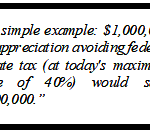
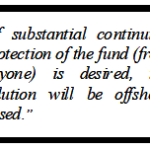

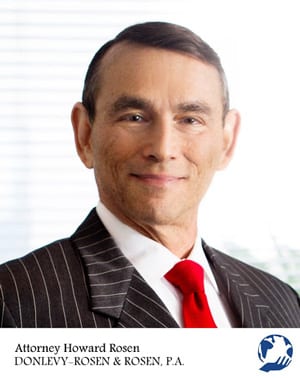

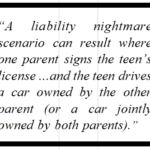
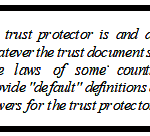
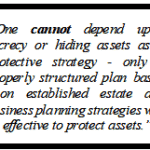
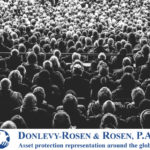
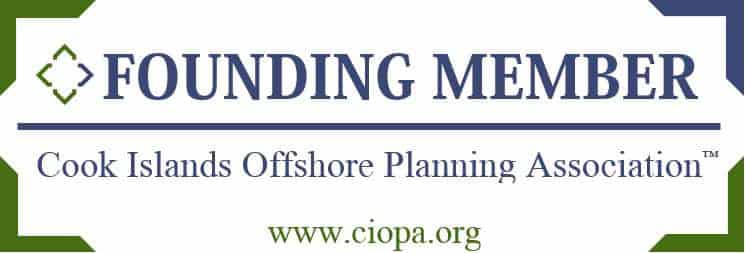
Connect
Connect with us on the following social media platforms.